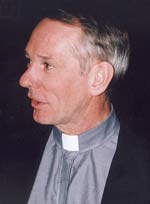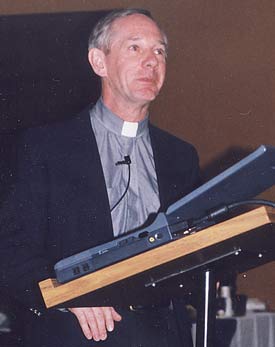By Cathy Carlyle
Christopher Corbally of the Vatican Observatory
"Saying that God created the universe does not explain either God or the universe. But it keeps our consciousness alive to the mysteries of awesome majesty that we might otherwise ignore and that deserve our respect." - physicist Charles Misner, as quoted by Christopher Corbally
If humans encounter extraterrestrials, will that mean our ideas of God have to change? If you believe in the Incarnation - that God became human - what would that do to your belief if you met intelligent life from elsewhere in space? Is the Incarnation a one-time, one-place event, or can it be extended to other places in the universe?
In essence, that was the theme of Christopher Corbally's talk delivered recently at York, entitled "Discovering ET, Discovering God". "Really, it is your own answers that are important, not mine," he said to the audience.
Jesuit priest, Vatican Observatory astronomer and vice director, and professor at the University of Arizona, Tucson, Corbally mentioned various books on the subject of people meeting ETs (eg H.G. Wells' War of the Worlds, and C.S. Lewis' The Space Trilogy). "While some touched on people's worst fears, that aliens were aggressive monsters," he said, "others portrayed ETs as potentially cooperative."
Struggle between good and evil
"What C.S. Lewis does is reflect on the struggle between good and evil. He explores the idea that if there are other beings, what happens to traditional Christian doctrines, particularly Adam and Eve and the fall of mankind. For Lewis, this is not a problem," said Corbally, explaining that the author developed a character, Weston, who subscribes to "particularity, seeing humans as the best in creation", and the hero, Ransom, who has another view.
Some of Lewis' stories were parallel to biblical stories. For instance, in the second novel, Ransom is transported to Venus, a planet thinly disguised as "Perelandra", and there meets an "Eve" character. "Ransom, the Christ-figure, saves 'Eve' from Evil, which is in the person of Weston," said Corbally. "Yet Lewis says that Jesus never repeated himself. He saved Venus not through himself as Jesus but through himself in Ransom."

The question of the "plurality à la Perelandra and Earth - multiple Eves" has been discussed by people such as Ernan McMullin (science historian, University of Notre Dame), he added. "McMullin asks, Does this mean there are multiple incarnations of God, that God did not become just human but was incarnated in other forms as well, such as through ETs? And, if so, how do we deal with that?"
What beliefs will be unchanged?
He said it is an interesting thought that people's ideas might be changed if they had an encounter with an ET - "changed, in the sense that these ideas depend on our culture, our understanding of our place in the universe." But, he added, is there something at the core of our understanding of the cosmos that will be unchanged in any encounter?
Referring to physicist Freeman Dyson's seven horizons of humanity, Corbally said, "For instance, you can see yourself in 10 years time. You can't see 100 years hence, but you have an idea of what the institutions and causes will be. If you project 1,000, then 10,000 and then 100,000 years - by then perhaps there will be globules of civilizations around the universe. In one million years we might have changed so much that there will be a new humanity.
"It is this scale we are talking about when we think of ETs. It's likely that contact with ETs would be with a civilization very much older than our own, and it's that 'older-than-our-own' idea that makes Jill Tarter think about 'cosmic religion'." (Tarter is the director of the Search for Extraterrestrial Intelligence Institute.) She says humans should think in terms of "vast", particularly in years, said Corbally, and that perhaps one day religion will be simplified and standardized, "at home" with science and technology.
Corbally launched into theories about the origin of the universe, leading the audience through from the Big Bang to the present day to what the future might be, concluding, "There are quite some wonders out there." He then quoted Loyal Rue of Luther College in Decorah, Iowa, on the universe's beginnings:
"Matter was distilled out of radiant energy, segregated into galaxies, collapsed into stars, fused into atoms, swirled into planets, spliced into molecules, captured into cells, mutated into species, compromised into ecosystems, provoked into thought and cajoled into culture."
"It's a wonderful story"
"It's a wonderful story," said Corbally, "but what does this (and other explanations) tell us about God?" He said he, personally sees the universe as full of "an incredible diversity" among atoms, dust, clouds of gas, stars, planets, "and yet there is a unity about it all, making an epic that we can follow."

In the Christian doctrine of the Trinity there is at the same time a diversity and a unity - "God is three persons, whatever 'person' means as far as God is concerned; yet there is a unity because there are three persons in God, not three gods."
The universe also contains love, he said, something that cannot be analyzed through science. "But you can know love. Love is between people. In science we have interactions between things, but interactions between humans is vital. What is becoming clear is that the development of neurons in our brain depends very much on the interactions we have when we are being formed and in our early childhood.
"Diversity-and-unity, beauty and interactions are very much a part of our scientific understanding of the universe. These for me reflect aspects of the Creator. So, for me, there is an aspect of God in the universe...an awesomeness that is the heart of God.
"And is that idea going to change if we encounter an ET? I think not, because these beliefs are anchored in how things are. Yes, some science is going to change if we meet ETs. The perspectives are going to change. But I think there is a part that is fixed in our hearts, a real understanding of the universe and so of its Creator, that will stay."
Christopher Corbally's talk was third in "The Quest for Contact: In Search of Extraterrestrial Life" seminar series, which is presented by the Science and Society Program and Bethune College and sponsored by the Office of the Vice-President Academic and the Division of Humanities.